Betriebliche Dynamiken und Beschäftigungsergebnisse
Firmengründungen und -schließungen sind in einer Marktwirtschaft für die Reallokation von Ressourcen, strukturellen Wandel und damit für die wirtschaftliche Entwicklung von zentraler Bedeutung und spielen vor allem im Hinblick auf die wirtschaftliche Transformation Ostdeutschlands eine zentrale Rolle. Gleichzeitig können die mit dem Strukturwandel verbundenen Arbeitsplatzverluste dramatische Folgen für betroffene Arbeitnehmer haben, wie z.B. Arbeitslosigkeit, Einkommensverluste oder eine geringere Arbeitsplatzqualität. Diese Forschungsgruppe untersucht mithilfe mikroökonometrischer Methoden Gründungen, Wachstumsprozesse und das Scheitern von Unternehmen, die Anzahl und Qualität der von Neugründungen geschaffenen Arbeitsplätze und die Folgen von Firmenschließungen für betroffene Arbeitnehmer und Arbeitnehmerinnen, vor allem in Bezug auf Arbeitsmarktergebnisse wie Beschäftigung und Löhne.
Forschungscluster
Produktivität und InstitutionenIhr Kontakt

Mitglied - Abteilung Strukturwandel und Produktivität
PROJEKTE
01.2020 ‐ 06.2024
Europas populistische Parteien im Aufwind: die dunkle Seite von Globalisierung und technologischem Wandel?
VolkswagenStiftung
Die Globalisierung hat zwar allgemein den Wohlstand gesteigert, aber in vielen Regionen Europas auch zu Arbeitslosigkeit, Lohnungleichheit, Abwanderung und Überalterung geführt. Das Projekt untersucht, ob diese ökonomischen Lasten zu Wählerstimmen für populistische Parteien führen.
01.2019 ‐ 06.2022
MICROPROD („Raising EU Productivity: Lessons from Improved Micro Data“)
Europäische Kommission
Ziel von MICROPROD ist es, zu einem besseren Verständnis der Herausforderungen beizutragen, die die vierte industrielle Revolution in Europa mit sich bringt. Verliert das Produktivitätswachstum im Kontext von Globalisierung und Digitalisierung an Schwung, und wenn ja, warum?
This project has received funding from the European Union’s Horizon 2020 research and innovation programme under grant agreement No 764810.
07.2018 ‐ 12.2020
Firmenlohndifferentiale in unvollkommenen Arbeitsmärkten: Die Rolle von Marktmacht und industriellen Beziehungen in der Aufteilung der Beschäftigungsrenten zwischen Arbeitnehmern und Arbeitgebern
Deutsche Forschungsgemeinschaft (DFG)
Ziel dieses Projekts ist es, die Aufteilung der Beschäftigungsrenten auf unvollkommenen Arbeitsmärkten und den Einfluss von Arbeitsmarktinstitutionen wie Tarifbindung und betrieblicher Mitbestimmung auf Firmenlohndifferentiale zu untersuchen. Über die Grundlagenforschung hinaus hat das Projekt damit Potential, wichtige wirtschaftspolitische Debatten zur institutionellen Ausgestaltung des Lohnfindungsprozesses zu informieren.
02.2019 ‐ 09.2019
Auswertung des IAB-Betriebspanels 2018 und Erstellung eines Ergebnisberichts für West- und Ostdeutschland
04.2016 ‐ 03.2019
Lohn- und Beschäftigungseffekte von Insolvenzen
Deutsche Forschungsgemeinschaft (DFG)
Ziel des Projekts ist es, erstmals den Prozess und die Folgen des Scheiterns von Unternehmen ausführlich zu analysieren. Insbesondere ist es im Rahmen dieses Projekts erstmals möglich, die Folgen kleinbetrieblicher Insolvenzen zu erforschen, was vor allem deshalb relevant ist, weil Arbeitnehmer in Betrieben mit weniger als zehn Beschäftigten etwa viermal so häufig von Insolvenzen betroffen sind wie Arbeitnehmer in Großbetrieben.
01.2018 ‐ 12.2018
Auswertung des IAB-Betriebspanels 2017 und Erstellung eines Ergebnisberichts für West- und Ostdeutschland
01.2017 ‐ 09.2017
Auswertung des IAB-Betriebspanels 2016 und Erstellung eines Ergebnisberichts für West- und Ostdeutschland
Referierte Publikationen
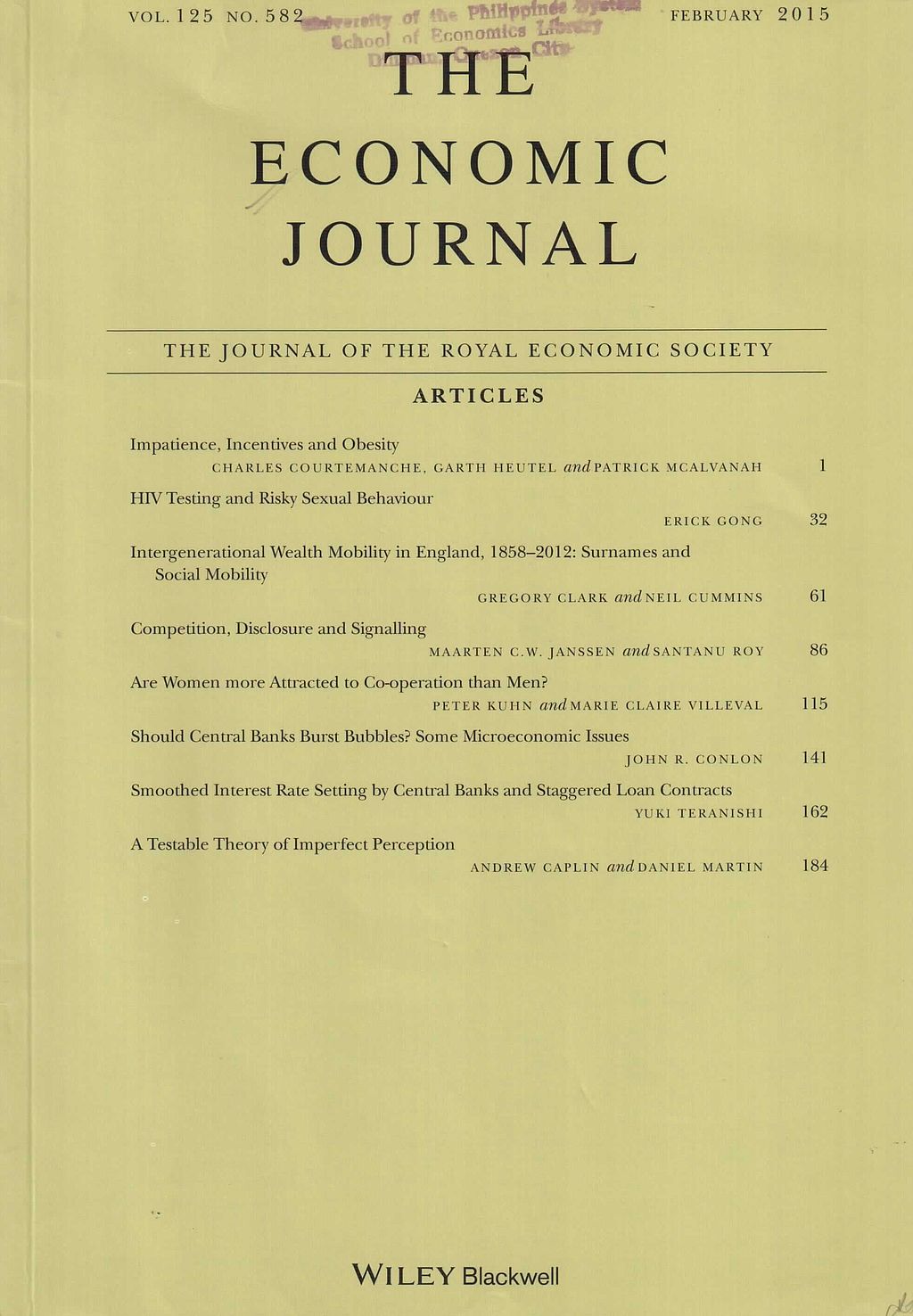
The Productivity Effect of Temporary Agency Work: Evidence from German Panel Data
in: Economic Journal, Nr. 562, 2012
Abstract
This study investigates the effect of temporary agency work on the user firm’s productivity. We hypothesise that using temporary agency work to enhance numerical flexibility and to screen job candidates may increase productivity, whereas temporary workers’ lower firm-specific human capital and spillover effects on the user’s permanent employees may adversely affect productivity. Other than the sparse existing literature on this issue, we exploit a large panel data set and control for time-invariant and time-varying unobserved heterogeneity by using the system GMM estimator. We find a robust hump-shaped effect of the extent of temporary agency work on the user firm’s productivity.
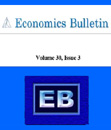
Do Women Benefit from Competitive Markets? Product Market Competition and the Gender Pay Gap in Germany
in: Economics Bulletin, Nr. 2, 2012
Abstract
Using a large linked employer–employee dataset for Germany with a direct plant-level measure of product market competition and controlling for job-cell fixed effects, we investigate whether relative wages of women benefit from strong competition. We find that the unexplained gender pay gap is about 2.4 log points lower in West German plants that face strong product market competition than in those experiencing weak competition, whereas no such link shows up for East Germany.
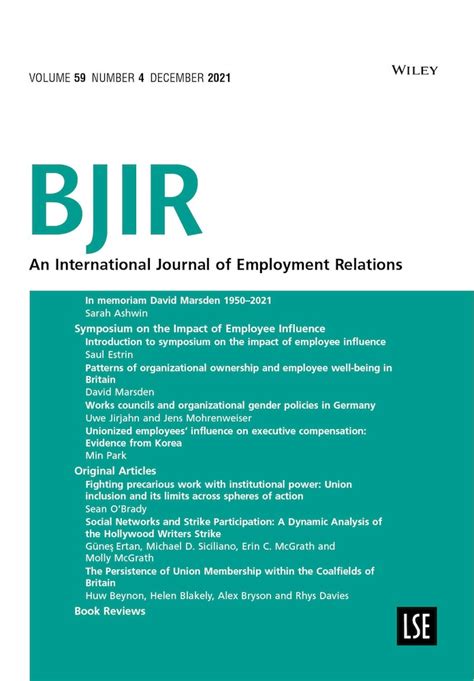
Works Councils and Firm Profits Revisited
in: British Journal of Industrial Relations, Nr. 1, 2011
Abstract
As they are employee associations, it is typically presumed that works councils redistribute economic rents from firm owners to workers. And indeed, the empirical literature suggests that German works councils reduce profits. The studies on the profitability effect of works councils mainly use self-reported subjective profit evaluations of managers as the dependent variable. I argue that these are poor measures of real profits. Newly available information on firms' capital stock allows me to revisit the profit effect now using an objective profit measure. When utilizing the subjective measure I find the standard results; with the objective measure, however, the works council effect on profits is positive and significant.
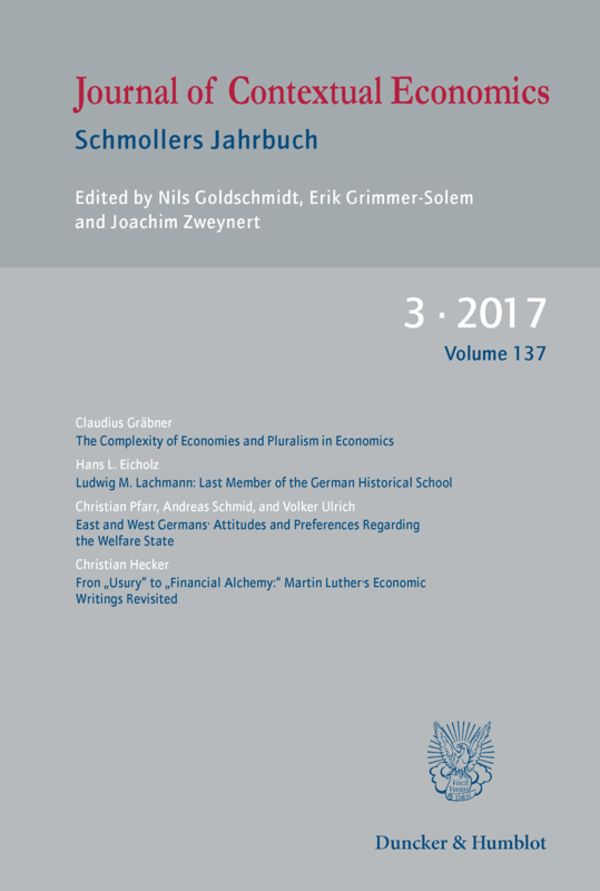
Betriebsräte und betriebliche Produktivität
in: Schmollers Jahrbuch, Nr. 1, 2011
Abstract
Betriebliche Mitbestimmung der Arbeitnehmer durch Betriebsräte ist ein zentrales Element der industriellen Beziehungen in Deutschland. Dennoch besteht trotz langjähriger Forschung keine Einigkeit über ihre Wirkung auf die betriebliche Produktivität. In diesem Papier wird zunächst der statistische Zusammenhang zwischen Betriebsrat und Produktivität mit Hilfe des IAB Betriebspanels empirisch untersucht. Betriebe mit Betriebsrat erweisen sich als um 9 Prozent produktiver. Es wird anhand der Ergebnisse dieser und anderer Studien argumentiert, dass die Wirkung von Betriebsräten auf die Produktivität den geschätzten statistischen Zusammenhang übersteigt.
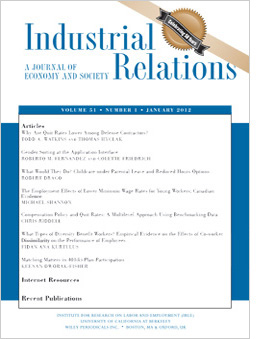
Works Councils and Separations: Voice, Monopoly, and Insurance Effects
in: Industrial Relations, Nr. 4, 2010
Abstract
Using a large linked employer–employee data set for Germany, we find that the existence of a works council is associated with a lower separation rate to employment, in particular for workers with low tenure. While works council monopoly effects show up in all specifications, clear voice effects are only visible for low tenured workers. Works councils also reduce separations to nonemployment, and this impact is more pronounced for men. Insurance effects only show up for workers with tenure of more than 2 years. Our results indicate that works councils to some extent represent the interests of a specific clientele.
Arbeitspapiere
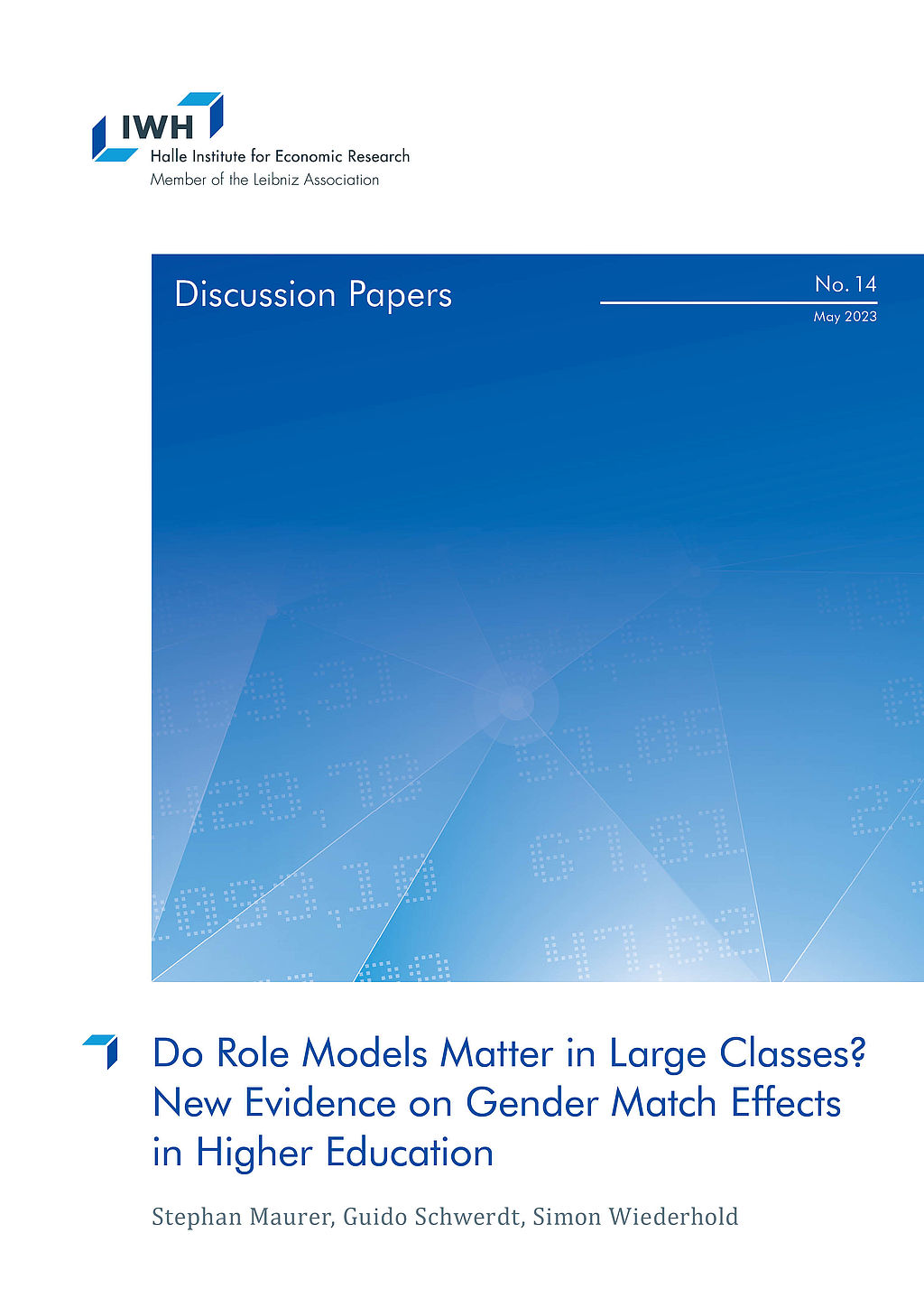
Do Role Models Matter in Large Classes? New Evidence on Gender Match Effects in Higher Education
in: IWH Discussion Papers, Nr. 14, 2023
Abstract
It is well established that female students perform better when taught by female professors. However, little is known about the mechanisms explaining these gender match effects. Using administrative records from a German public university, which cover all programs and courses between 2006 and 2018, we show that gender match effects are sizable in smaller classes, but are absent in larger classes. These results suggest that direct and frequent interactions between students and professors are crucial for gender match effects to emerge. In contrast, the mere fact that one’s professor is female is not sufficient to increase performance of female students.
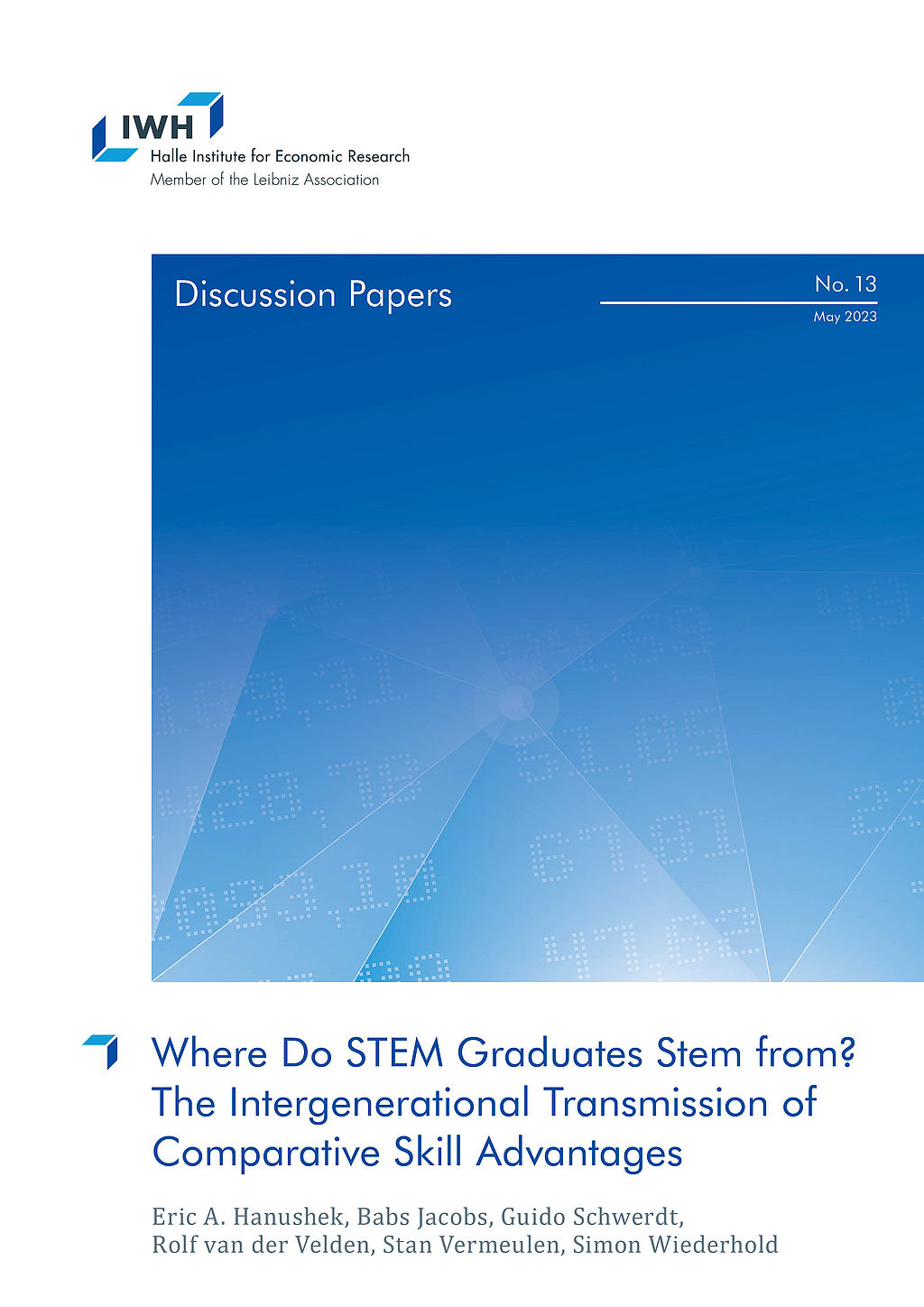
Where Do STEM Graduates Stem from? The Intergenerational Transmission of Comparative Skill Advantages
in: IWH Discussion Papers, Nr. 13, 2023
Abstract
The standard economic model of occupational choice following a basic Roy model emphasizes individual selection and comparative advantage, but the sources of comparative advantage are not well understood. We employ a unique combination of Dutch survey and registry data that links math and language skills across generations and permits analysis of the intergenerational transmission of comparative skill advantages. Exploiting within-family between-subject variation in skills, we show that comparative advantages in math of parents are significantly linked to those of their children. A causal interpretation follows from a novel IV estimation that isolates variation in parent skill advantages due to their teacher and classroom peer quality. Finally, we show the strong influence of family skill transmission on children’s choices of STEM fields.
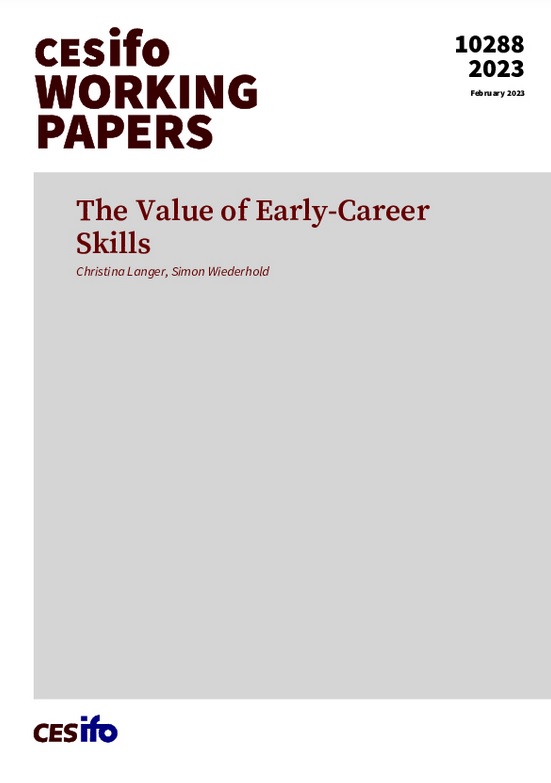
The Value of Early-Career Skills
in: CESifo Working Paper, Nr. 10288, 2023
Abstract
We develop novel measures of early-career skills that are more detailed, comprehensive, and labor-market-relevant than existing skill proxies. We exploit that skill requirements of apprenticeships in Germany are codified in state-approved, nationally standardized apprenticeship plans. These plans provide more than 13,000 different skills and the exact duration of learning each skill. Following workers over their careers in administrative data, we find that cognitive, social, and digital skills acquired during apprenticeship are highly – yet differently – rewarded. We also document rising returns to digital and social skills since the 1990s, with a more moderate increase in returns to cognitive skills.
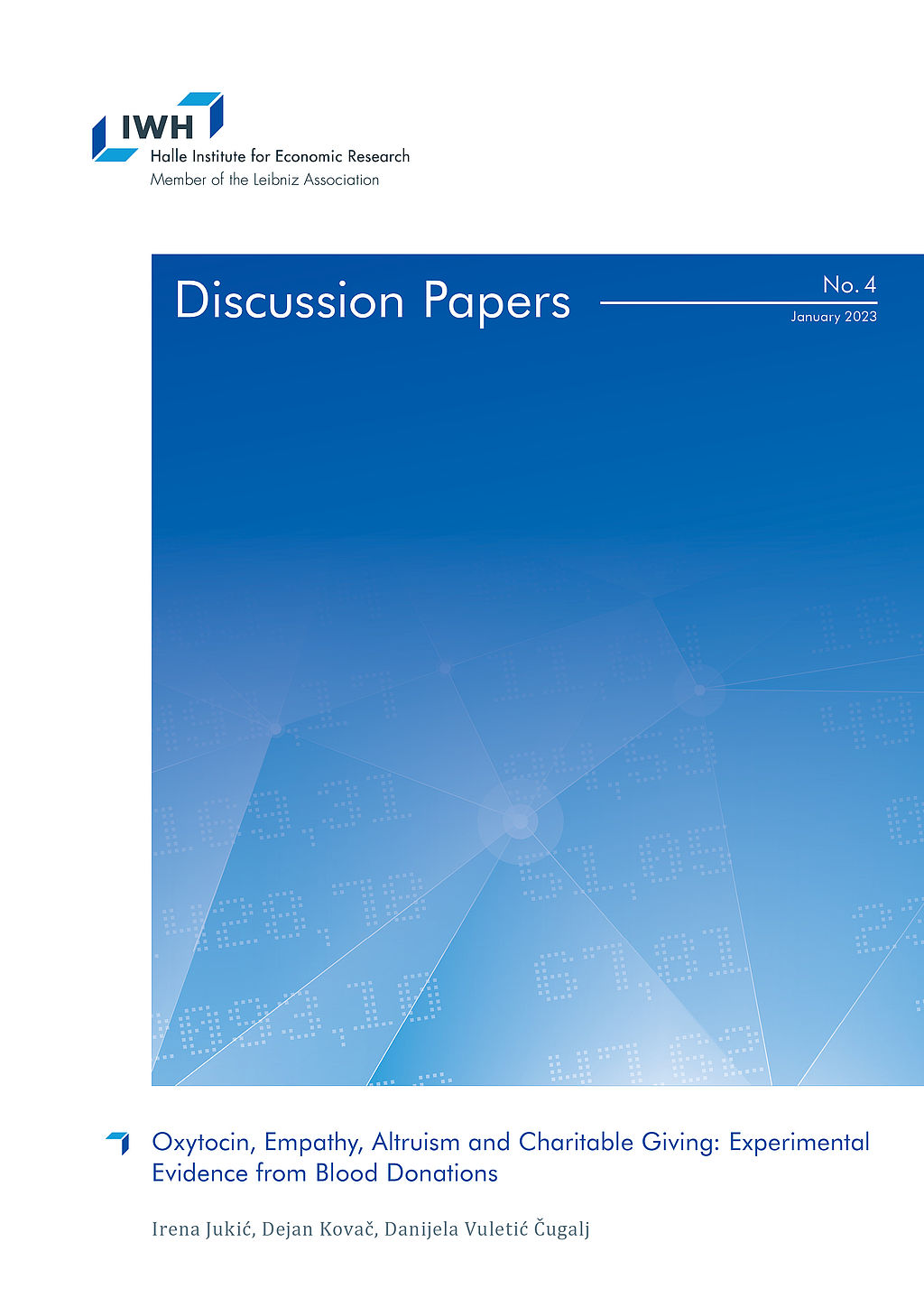
Oxytocin, Empathy, Altruism and Charitable Giving: Experimental Evidence from Blood Donations
in: IWH Discussion Papers, Nr. 4, 2023
Abstract
We conducted a field experiment in the natural setting of blood donations to test how oxytocin relates to empathy and altruism. We randomly assigned blood donors in the Croatian Institute for Transfusion Medicine to three groups with the aim to induce different levels of empathy by showing a neutral video to the donors from the control group and an emotional to the donors from the first and second treatment groups. In addition to watching the emotional video, donors from the second treatment group are given a gift which relates to the emotional story from the video. We find no effect of our treatment on induced levels of oxytocin. Null effects of our treatments could be explained by the above average baseline levels of oxytocin and inability of our treatments to provoke emotional stimuli in blood donors. Nonetheless, for our empathy measures we find the effect of gift exchange on empathic concerns, but not on perspective taking. After our experimental treatments, we followed the return of our blood donors for a whole year. We find that only variable which consistently predicts return for blood donation in stated period is the number of previous donations. From policy perspective it is an important finding. Especially for hospitals and other blood providers when faced with time and resource constraints.
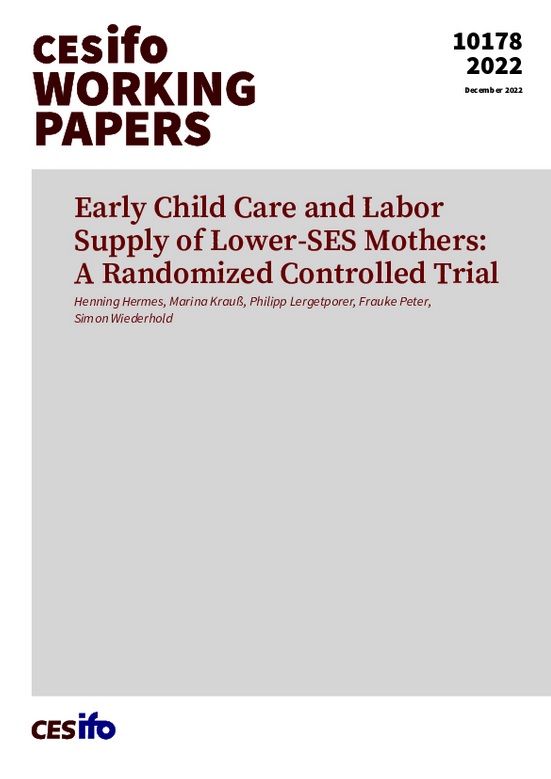
Early Child Care and Labor Supply of Lower-SES Mothers: A Randomized Controlled Trial
in: CESifo Working Paper, Nr. 10178, 2022
Abstract
We present experimental evidence that enabling access to universal early child care for families with lower socioeconomic status (SES) increases maternal labor supply. Our intervention provides families with customized help for child care applications, resulting in a large increase in enrollment among lower-SES families. The treatment increases lower-SES mothers' full-time employment rates by 9 percentage points (+160%), household income by 10%, and mothers' earnings by 22%. The effect on full-time employment is largely driven by increased care hours provided by child care centers and fathers. Overall, the treatment substantially improves intra-household gender equality in terms of child care duties and earnings.


















